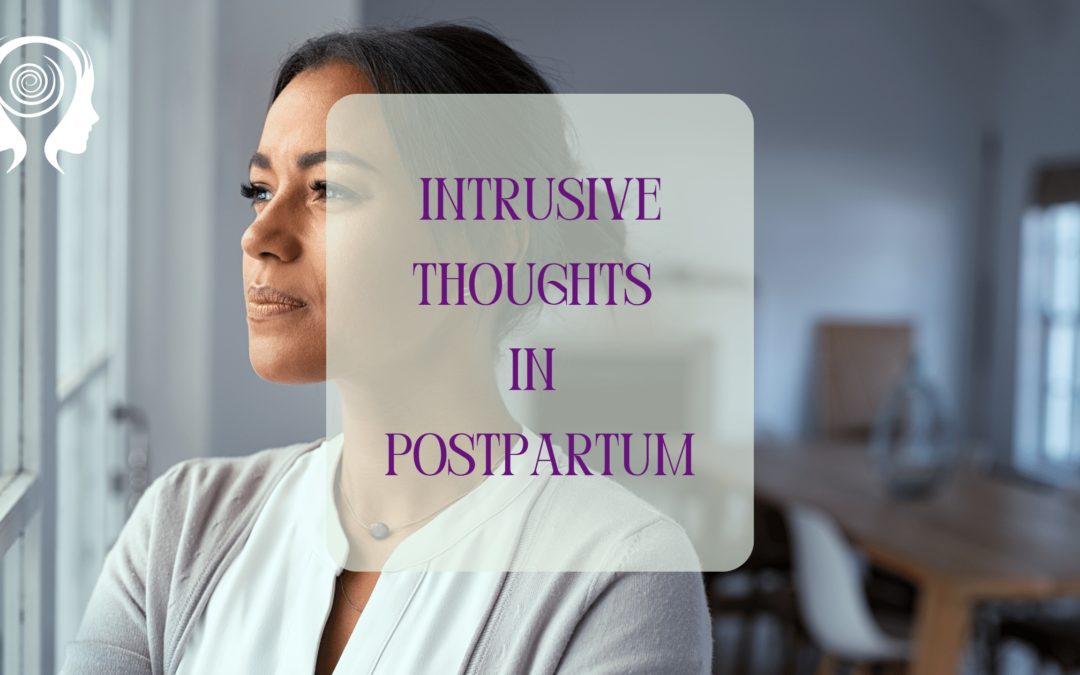Studies show that around 55% of women experience intrusive thoughts in postpartum. These thoughts are disturbing and feel out of our nature. It’s important to know how to deal with them and when to reach out for further help.
With my second baby, I’ve been more mindful about how I’m feeling, thinking and behaving in postpartum. Mainly, to notice early signs of postpartum depression and anxiety.
Recently, I’ve noticed an increase in disturbing thoughts that pop into my head. It can be an image of me dropping my baby while going down the stairs or a thought about someone kidnapping her. These thoughts and images are what we call intrusive thoughts.
What are intrusive thoughts in postpartum
 Intrusive thoughts are unwanted, upsetting thoughts, images or ideas that involuntarily come to our head. They can pop up at any time, usually cause distress and can be hard to manage or get rid of. Intrusive thoughts in postpartum are ego-dystonic – they don’t feel right and are not part of our nature.
Intrusive thoughts are unwanted, upsetting thoughts, images or ideas that involuntarily come to our head. They can pop up at any time, usually cause distress and can be hard to manage or get rid of. Intrusive thoughts in postpartum are ego-dystonic – they don’t feel right and are not part of our nature.
There are different types of intrusive thoughts: self-harm, violence or harm to others, sexual, religious, health concerns, and self-doubt.
Many new moms and people around them get worried when mom has intrusive thoughts about hurting their baby. This is because they are afraid that the mother will act on the thoughts they have which might happen in a case of postpartum psychosis.
The best indicator that the mom is experiencing intrusive thoughts instead of paranoid, delusional thoughts indicative of postpartum psychosis is that the person doesn’t believe the thoughts, it’s disturbing to them, and they don’t want to act on the thoughts.
Intrusive thoughts can be part of the obsessive-compulsive disorder (OCD) but most women in postpartum, who are experiencing them, don’t meet the criteria for OCD.
What to do when you are experiencing intrusive thoughts in postpartum?
Intrusive thoughts are disturbing and sometimes we feel ashamed about the content. Thus, making us want to get rid of them and hide them from others which makes them pop up more and maybe even scarier.
However, what we need to do is the opposite. We need to acknowledge them for what they are – an intrusive thought. “Name it to tame it” as Dr. Siegel would say.
Also, instead of avoiding it and trying to push the thought away, just let it be. You can use mindfulness techniques of just looking at the intrusive thought as a cloud floating through the sky or a car driving by.
Reducing the shame around having intrusive thoughts is another way to deal with them. Tell people close to you what you are experiencing and educate them about intrusive thoughts. This gives you back the power and control.
When to reach out for help when you are experiencing intrusive thoughts in postpartum?
From an evolutionary standpoint, intrusive thoughts in postpartum can be protective as they make us more vigilant when caring for our baby. However, sometimes the negative feelings overpower the possible benefit. That is when we need to reach out to a psychologist specialized in perinatal mental health.
These are the signs that you need to reach out for help when you are experiencing intrusive thoughts in postpartum:
- You are avoiding certain things or activities – for example, not bathing or taking your baby to the pool.
- Changing your behaviour because of an intrusive thought – for example, you start taking baby down the stairs by scootching on your bum instead of walking down.
- You are checking constantly to ensure that the thought is not true – for example, checking your baby every few minutes to make sure she is still breathing.
- Intrusive thoughts are keeping you up at night because of the distress and anxiety they are causing you.
- You are bothered by the thoughts and would like to learn how to cope with them.
Support is out there
Many women in postpartum experience intrusive thoughts which are disturbing thoughts or images that bring up negative emotions and feel out of character.
In some instances, other than causing distress, they are harmless when we know how to cope with them.
However, sometimes they affect our lives by making us avoid certain activities or change our behavior. That is when you definitely need to reach out for help.
Helping women in postpartum cope with intrusive thoughts is one of my specialties. If you have noticed that disturbing thoughts and images are causing you distress or have changed your daily routine, reach out for a free consultation to see how I can support you!


